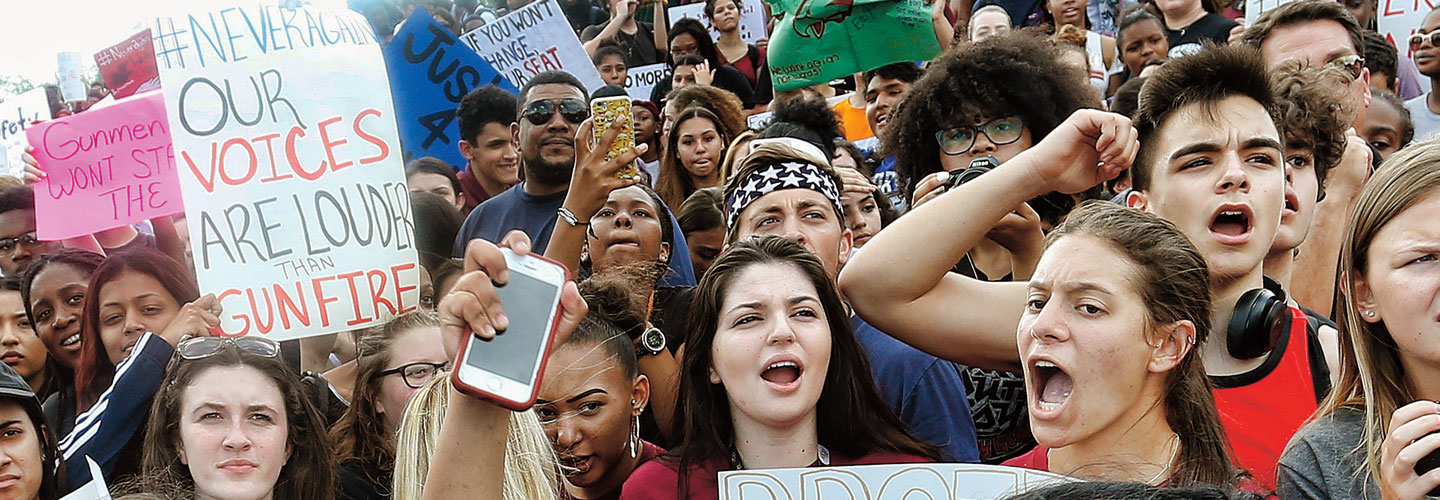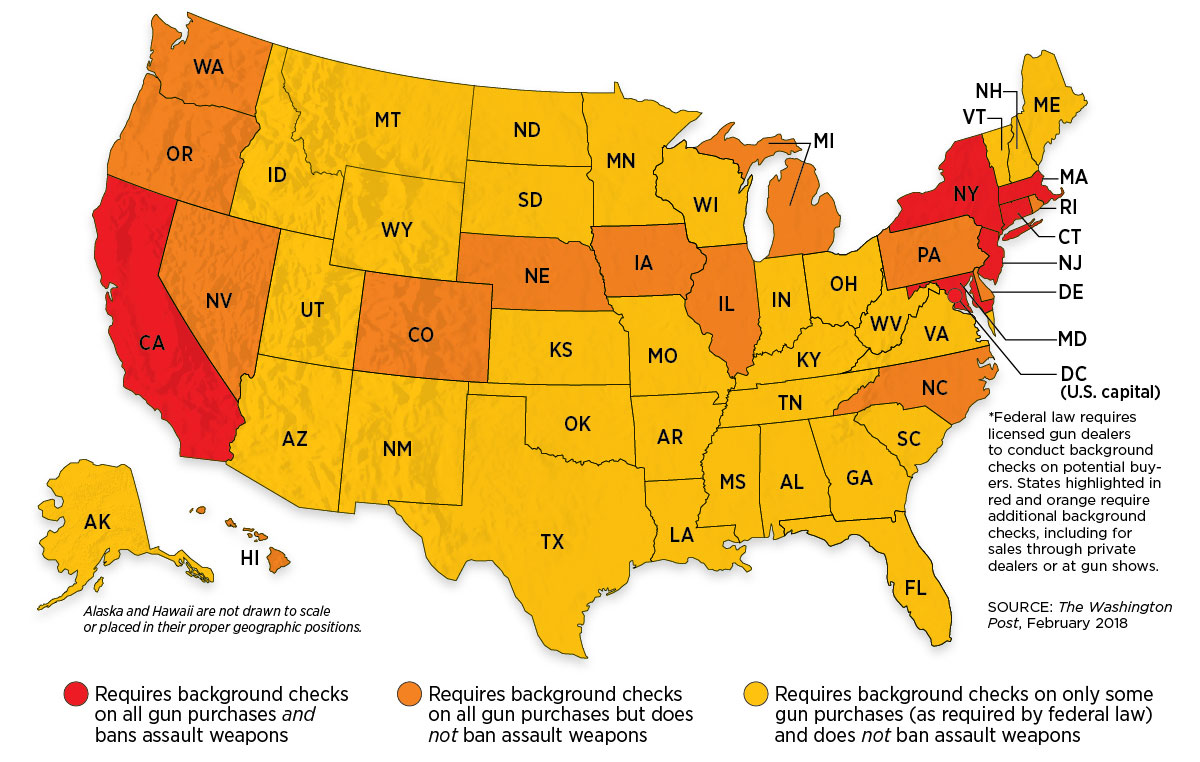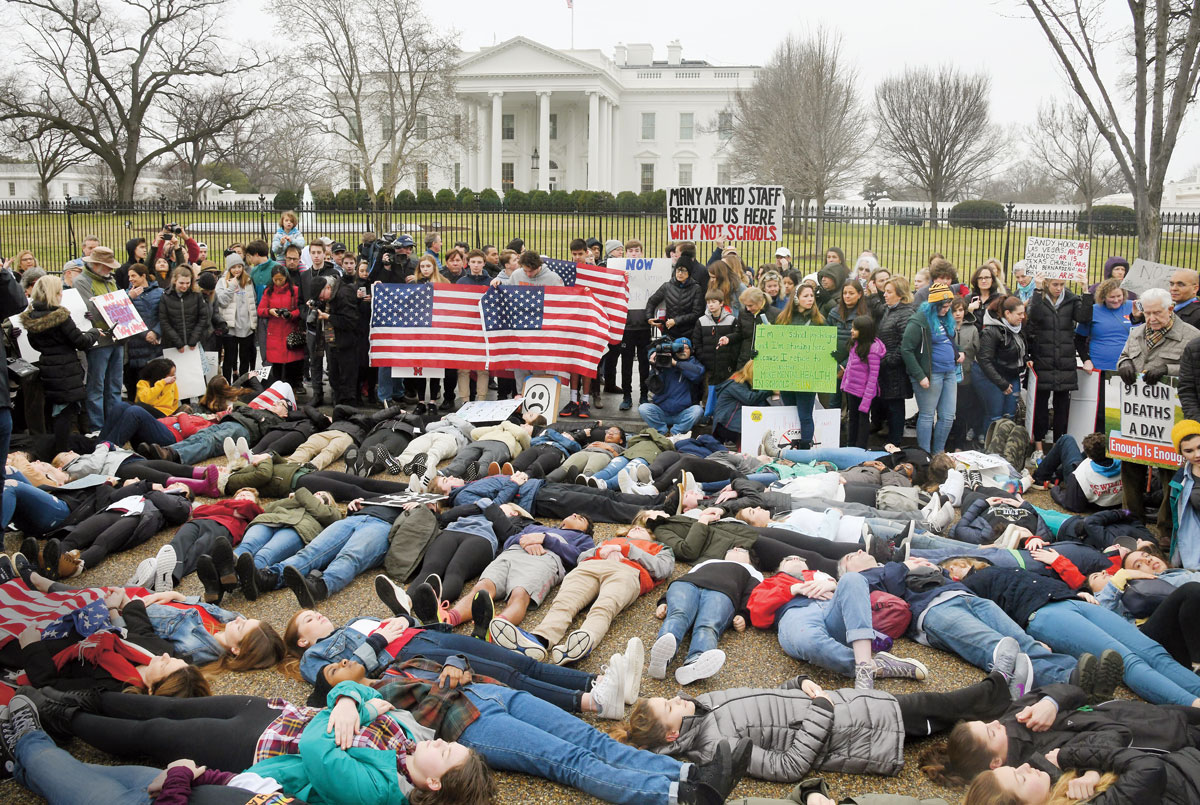Click here to download a printer-friendly PDF of the article.

Florida students rally in front of Marjory Stoneman Douglas High School in support of gun control on February 21.
SPECIAL REPORT
“We’re the Generation That’s Going to End It”
The response to the recent school shooting in Florida has been a surge of activism among students nationwide. Can they change the debate on guns?
Huddled in a classroom closet with about 60 other students, Alex Wind listened as bursts of gunfire echoed through the hallways of Marjory Stoneman Douglas High School. Desperate with fear, Alex texted his parents what he thought might be a goodbye: “I think there’s a shooter on campus . . . I love you guys.”
He made it out safely, but 17 people were killed at the school in Parkland, Florida, on February 14. (The shooter, Nikolas Cruz, a former student there, was taken into custody shortly after the attack.)
Alex’s feelings soon turned from grief to anger to determination. At a vigil the day after the shooting, he and his best friend, Cameron Kasky, vowed to do more than just comfort each other and their classmates. They decided to push for stronger gun laws in the United States.
Within days, the group they formed along with other Stoneman Douglas students had a name—Never Again—and tens of thousands of social media followers. Before long, Alex and his classmates had thrown themselves into staging political rallies, researching the legal framework of gun control (the broad term for regulations on firearms), and giving interviews.
The students have spoken with lawmakers in Florida’s capital, Tallahassee, to press for changes to state laws. They’ve traveled to Washington, D.C., to meet with members of Congress and President Donald Trump. Their
“It was incredible to see how something that we started snowballed,” says Alex, a 17-year-old junior.
Students across the country are demanding action on guns.
But enacting firearm regulations has never been easy. In fact, Congress hasn’t passed meaningful gun reform laws in decades.
Yet the Parkland teens and their supporters are not giving up. At press time, students, teachers, and administrators across the country were expected to take part in a national school walkout on March 14. And a student-led march on Washington in support of gun control—set for March 24—was expected to draw 500,000 people.
Matt Bennett of Third Way, a research organization based in the nation’s capital, says the determination of all these young people could have a lasting impact. “If they do remain engaged,” he says, “we could see a
A National Movement
Today’s teens have grown up in a world reshaped by school shootings. That includes the 1999 attack at Columbine High School in Colorado, in which two teens killed 13 people, and the 2012 attack at Sandy Hook Elementary School in Connecticut, in which a former student fatally shot 20 children and 6 adults.
Unlike previous generations, young people today have spent years practicing active-shooter drills. They’ve wondered whether a shooting could happen at their school, and who might do it.
So for many of the Parkland students, the response in the aftermath of the attack wasn’t so much shock as a desire to take action. Practically overnight, they went from typical teens focused on friends and homework to dedicated political activists. Their poise and determination have earned them access to the president and Congress—and the attention of the nation.
“We’re seeing lots and lots of students . . . standing up and taking action.”
Parkland senior Emma González—one of the leaders of Never Again—became an overnight celebrity after her impassioned speech about guns went viral (see “Faces of the Movement” sidebar, below). The 18-year-old didn’t even have a Twitter account until two days after the shooting at her school. Now she has more than 1 million followers.
That visibility has led thousands of other students across the country to take up the cause.
“We’re seeing lots and lots of students who weren’t directly impacted by this standing up and taking action,” says Angus Johnston, a professor at Hostos Community College in New York City. “It’s merging into a national movement.”
One of the students inspired to get involved is Caroline Kassir, 18, who helped lead a walkout at her high school in Arlington, Virginia.
“There’s something about seeing people your age standing up and making speeches and fighting for change that makes you feel like you can do it too,” says Caroline. “This is a personal issue for everyone. It could be any of us.”
Tough Fight Ahead
Despite the students’ passion, convincing lawmakers to enact stricter gun control measures will be an uphill battle. One major challenge is that Americans are so divided on the issue. Following the Stoneman Douglas shooting, a Politico/Morning Consult poll found that 68 percent of registered voters in the U.S. favored tougher gun laws, while 25 percent opposed more regulations.
Those in favor of gun control—generally Democrats and people in cities—say the more Americans who carry weapons, the more likely it is that someone will use one to kill innocent people. They cite figures that equate high rates of gun ownership with more gun violence.
Meanwhile, gun rights advocates—generally Republicans and people in rural areas—see possession of firearms as a matter of individual rights. They say the
Gun Laws by State
This map shows which states ban assault weapons and/or require additional background checks beyond what is already required by federal law.*


With that in mind, some states have taken steps to loosen gun restrictions in the aftermath of the Parkland shooting. A number of lawmakers and President Trump have also suggested that some teachers be armed as a way to deter shooters and protect students.
Another factor is the National Rifle Association (NRA), the powerful lobbying group that’s adamantly opposed to restrictions on gun ownership. For many lawmakers in Washington, the NRA’s stamp of approval—and in some cases its financial backing—is critical to getting reelected.
That’s partly why Bennett of Third Way believes the odds are stacked against the Parkland teens—at least in the immediate future. Days after the shooting, the Florida state legislature voted against discussing a ban on assault weapons like the one used in the attack. The vote left some of the students in tears.
“The big question is how long will young people remain engaged on this issue if they’re frustrated by what happens in the short term,” Bennett says. “Because they’re probably going to be.”
Major Achievements
Already, though, the Parkland teens have made some progress. In the aftermath of the shooting, for example, a number of states have moved to enact gun control measures. Lawmakers in Florida recently passed a bill raising the minimum age for buying guns from 18 to 21 and imposing a three-day waiting period on all gun purchases, among other restrictions. If signed into law, it would be the first gun control measure in Florida in more than 20 years.
Some retailers have also taken steps to limit the sale of firearms. Dick’s Sporting Goods and Walmart recently announced that they would raise their minimum age to buy a gun from 18 to 21.
President Trump has also expressed a willingness to support comprehensive gun reform. In a meeting with lawmakers two weeks after the shooting at Stoneman Douglas, Trump said, “It’s time that a president stepped up.”
In addition, experts note that the Parkland teens have been able to publicly hold politicians accountable in a way that few adults have.
In a televised town hall meeting, Cameron Kasky, a Stoneman Douglas junior, challenged U.S. Senator Marco Rubio, a Florida Republican who opposes many gun control measures: “Senator Rubio, can you tell me right now that you will not accept a single donation from the NRA in the future?” (Rubio didn’t directly answer the question, but pledged his support for the Second Amendment and for students’ right to feel safe at school.)

Teens lie in front of the White House as if they’re dead bodies on February 19, calling for action on gun control.

Tragedy Into Action
Yet even as they raise millions of dollars and plan nationwide rallies, the young survivors of the Parkland massacre are struggling with the trauma they’ve lived through.
“There are times where I just want to cry,” says Ashley Turner, a senior.
Many students say their activism is helping them grieve by giving some purpose to the senseless killings of their friends. They plan to keep pressing politicians on this issue in the months ahead. Many of them are already eligible to vote or are on the cusp of being able to.
“I guarantee you this will drive up the turnout rate among young people,” says Bennett, referring to the congressional elections in November. “This is about as
That’s what Caroline, the student organizer from Arlington, Virginia, is counting on. And she’s determined to be part of that change.
“We’ve seen so many shootings,” she says. “We’re the generation that’s had to grow up with this, but I truly believe that we’re the generation that’s going to end it.”
Additional reporting by The New York Times
CORE QUESTION: Why is it so difficult for the U.S. to address gun violence? Can student activism make a difference? Explain.
Don’t Let My Friends’ Deaths Be in Vain
Christine Yared, a 15-year-old freshman at Stoneman Douglas, wrote this opinion essay days after a gunman opened fire at her school.

In the days since the attack that killed 17 people here, I have continued replaying those terrifying moments in my head.
It began when a fire alarm went off just before school was supposed to end. We thought nothing of it. People in my finance class had already left, and I grabbed my backpack to evacuate. The next thing I knew, I heard people running and shouting. My teacher yelled at us to get back in class.
I sprinted to her closet and crammed myself against shelves filled with papers and binders. The rest of the closet filled up with the other students. We thought it was a drill. It wasn’t.
My phone flooded with messages from friends and family members asking if I was OK. I checked in with my sister and my friends, most of whom were safe or had evacuated. I texted my family and told them that I loved them.
After over an hour of confusion, the police finally came to get us. We ran out of the building with our hands over our heads. I have never run so fast. I met up with my friends and sat with them, still in shock. At home, it still didn’t feel real. We tried to watch TV to distract ourselves. We saw celebrities and politicians talking about our school. But it didn’t feel like our school. It seemed like a movie, a dream, a nightmare.
My friends, classmates, and teachers are dead. I see the media portraying them as good children who were smart and kind, but they were much more than that. My friend Gina is dead. I had just talked to her in art class that morning. We laughed together, we sang together, we smiled together. We will never do that again.
We can’t let innocent people’s deaths be in vain. We need to work together beyond political parties to make sure this never happens again. This tragedy could have been prevented. If there were tougher gun laws, including proper background checks, then those who should not have firearms would not have them.
Don’t let any more children suffer like we have. This may not seem relevant to you. But next time, it could be your family, your friends, your neighbors. Next time, it could be you.
Faces of the Movement
The Stoneman Douglas teens leading the call for gun control

Alex Wind
Age: 17
@al3xw1nd
“The reason we’re marching is that children are dying. We can’t have another child die in school. It’s absolutely absurd.”

Emma González
Age: 18
@Emma4Change
“We are going to be the kids you read about in textbooks . . . because . . . we are going to change the law.”

Cameron Kasky
Age: 17
@cameron_kasky
“I do not pretend to have all of the answers. However, even in my position, I can see that there is desperate need for change.”
How You Can Help Stop School Violence
BE KIND TO YOUR CLASSMATES
Teens who commit acts of violence on campus often report having felt bullied or excluded at school. One way to be more inclusive is to invite someone eating alone in the cafeteria to sit with you.
SPEAK UP
Four out of five school shooters reveal their plans before an attack. If you hear a classmate making threats, don’t keep it to yourself. Tell a teacher, a parent, or another trusted adult.
ADVOCATE FOR CHANGE
Pressure your local, state, and national leaders to do more to address mass shootings. If political activism isn’t your thing, get involved with an organization that’s dedicated to reducing gun violence.
Source: Sandy Hook Promise



